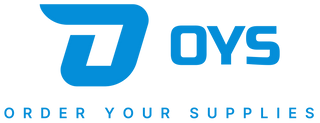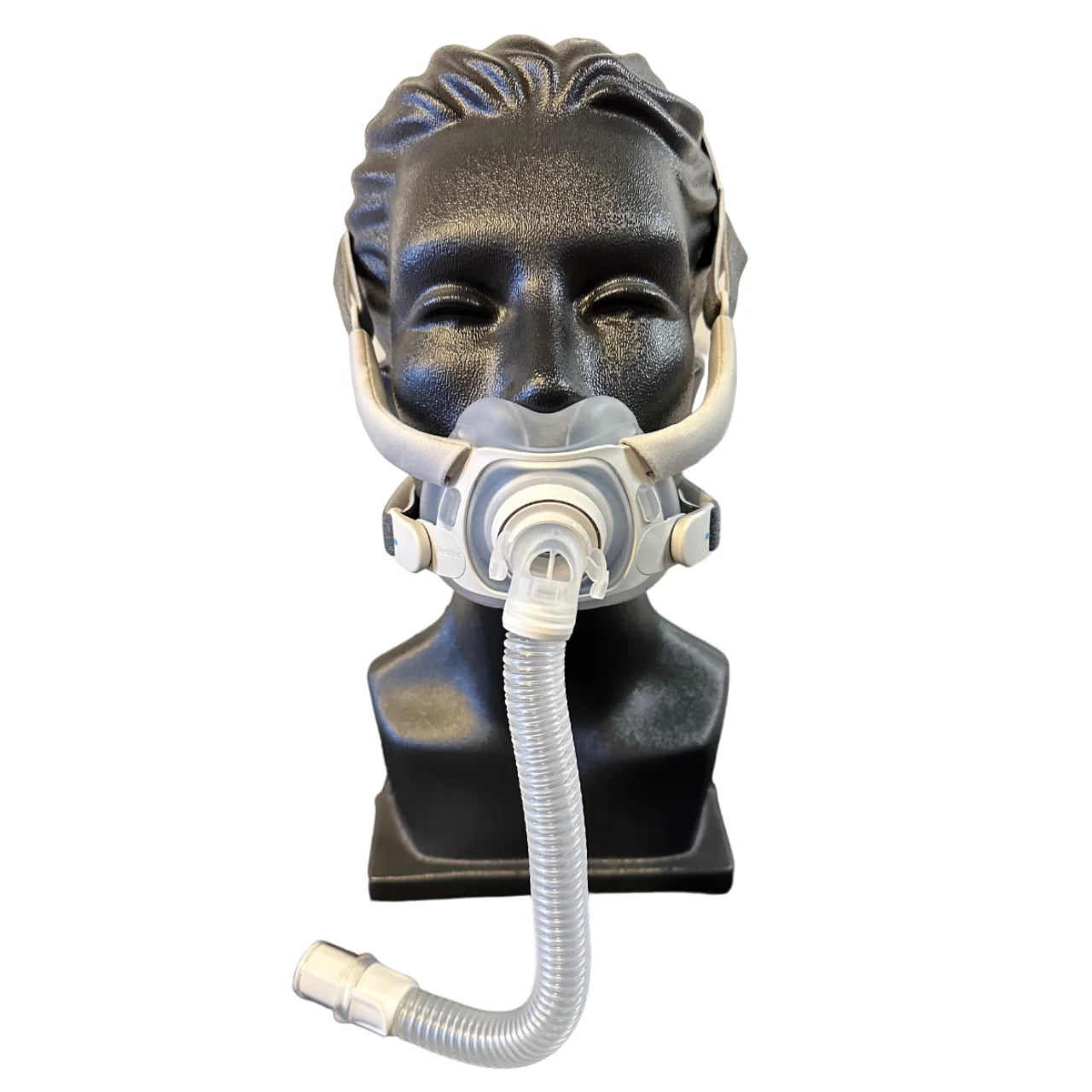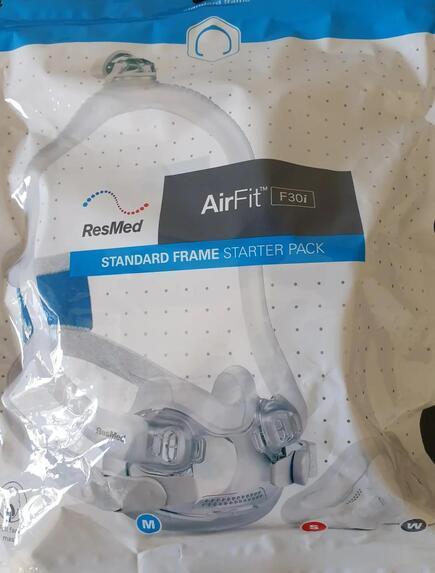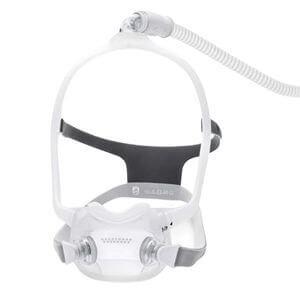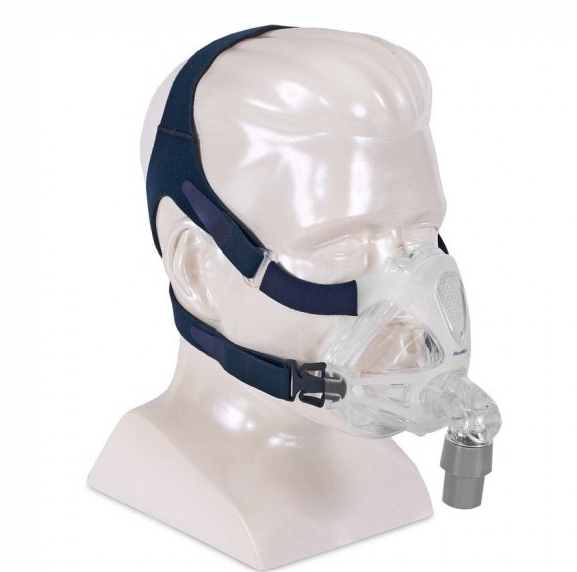Buy CPAP Masks for Glasses Wearers | Comfort & Fit
CPAP Masks For Those With Glasses
Discover the perfect CPAP masks for glasses wearers in our carefully curated collection. Specifically designed to accommodate your eye-wear, these masks offer a seamless fit, ensuring you can sleep soundly without any compromise. Say goodbye to uncomfortable nights and enjoy a restful sleep with our top-rated masks to wear with glasses. Whether you're looking for the best face mask for... Read More
Best CPAP Masks for Those With Glasses
For individuals with sleep apnea who wear glasses, choosing the right CPAP mask can be challenging. The added factor of wearing glasses introduces new considerations, such as comfort, seal integrity, and ease of use. Many CPAP users, especially those who wear glasses, struggle to find a mask that doesn't interfere with their ability to read, watch TV, or go about their nightly routine before bed. Here you can find some of the best CPAP masks that you can use while wearing your glasses.
Why Choosing the Right CPAP Mask Matters for Those Who Wear Glasses
Wearing glasses while using a CPAP mask can pose several challenges, from discomfort to difficulty creating a proper seal. For sleep apnea treatment to be effective, your CPAP mask must have a secure fit that ensures adequate airflow. However, a mask that presses on the nose or upper cheekbones can interfere with your glasses, making it uncomfortable to wear them while using the mask. For individuals who wear glasses, finding the best face mask for glasses wearers is crucial to ensuring comfort, effective therapy, and maintaining the ability to wear glasses without hassle. Here's why a well-fitted mask is essential for glasses wearers:
Minimizes Discomfort and Pressure
A mask that fits well ensures that there is no additional pressure on the nose or cheeks where glasses typically rest. Poorly fitted masks can cause pinching or discomfort, making it challenging to wear glasses for extended periods. A proper fit reduces these pressure points, allowing you to wear both your glasses and mask comfortably.
Prevents Air Leaks
Air leaks are a common issue with ill-fitting masks, especially when wearing glasses. A well-fitted mask ensures a tight seal, preventing air from escaping around the nose or eyes. This is particularly important for glasses wearers, as air leaks can fog up lenses and reduce the effectiveness of your CPAP therapy.
Maintains Clear Vision
For glasses wearers, the ability to see clearly while using a CPAP mask is important for activities like reading or watching TV before bed. The best masks to wear with glasses allow the glasses to sit comfortably on the nose without obstruction, ensuring clear vision and reducing the need to remove your glasses during therapy.
Improves CPAP Therapy Efficiency
A well-fitting mask is key to effective CPAP therapy. It ensures that the necessary air pressure is delivered consistently throughout the night. For glasses wearers, the best face mask to wear with glasses won’t interfere with the therapy, ensuring the airways remain open and the therapy is successful.
The good news is that many CPAP masks are designed to accommodate glasses wearers, allowing you to maintain your nightly routine without sacrificing comfort or effectiveness. Whether you’re looking for a full-face mask for glasses wearers or a nasal mask, there are plenty of options available.
Key Features to Consider When Choosing a CPAP Mask for Glasses Wearers
Before diving into specific mask recommendations, let’s take a look at some of the features you should consider when selecting the best CPAP mask for glasses wearers:
Minimal Contact with the Nose and Cheeks
Masks that sit high on the bridge of your nose can interfere with your glasses. Opt for masks that offer minimal facial contact, allowing your glasses to rest naturally without being displaced.
Open Field of Vision
Masks that cover less of your face or leave your eyes unobstructed are ideal for glasses wearers. This allows you to watch TV, read, or perform other activities without feeling restricted.
Flexible Cushioning
Look for masks with soft, flexible cushions that provide a comfortable fit around the nose without creating too much pressure. This can help maintain a good seal without interfering with your glasses.
Adjustable Headgear
The headgear plays a vital role in how well the mask fits. Adjustable headgear ensures your glasses stay in place while maintaining the mask’s seal.
Nasal Pillow Options
For glasses wearers, nasal pillows are often a popular choice. They offer minimal facial coverage, making them one of the best face masks for glasses wearers who want to read or watch TV before bed.
Top CPAP Masks for Those With Glasses
ResMed AirFit F30i Full Face CPAP Mask
- Top-of-the-head tubing keeps the front of your face free, allowing for easy wear of glasses.
- Minimal-contact design covers only the mouth and nose, leaving the upper face unobstructed.
- Magnetic headgear clips allow for quick adjustments.
- Ultra-compact cushion ensures a secure seal while maintaining comfort.
ResMed AirFit F40 Full Face CPAP Mask
- Soft silicone cushion offers a secure seal without pressing on the nose or cheeks.
- The headgear sits lower, preventing interference with your glasses.
- QuietAir™ vent technology minimizes noise for peaceful sleep.
Philips Respironics DreamWear Full Face CPAP Mask
- Under-the-nose design allows glasses to be worn comfortably.
- The tubing connects at the top of the head, leaving your face unobstructed.
- Flexible frame provides a secure yet gentle fit.
ResMed AirFit™ N30i Nasal Mask
- Minimalistic design with nasal pillows leaves your face and eyes unobstructed.
- Top-of-the-head tubing provides a clear field of vision.
ResMed AirFit™ P10 Nasal Pillow Mask
- Lightweight with minimal contact points.
- Nasal pillows provide a clear field of vision, perfect for glasses wearers.
Amara View Full Face CPAP Mask
- Under-the-nose design provides a clear line of sight.
- Adjustable headgear ensures a comfortable fit.
Tips for Wearing Glasses with a CPAP Mask
Choose the Right Mask Design
Select a mask that sits lower on the nose or uses nasal pillows. This prevents interference with glasses, allowing them to sit naturally on your face.
Adjust the Headgear
Loosen or tighten the straps to ensure your glasses rest comfortably while maintaining a proper seal.
Ensure a Good Fit
A snug fit reduces the risk of air leaks, ensuring both the mask and glasses remain comfortable during use.
Care and Maintenance Tips for Your CPAP Mask
Clean Daily
Use mild soap or CPAP-specific cleaning solutions to clean the mask cushion and headgear.
Avoid Harsh Chemicals
Avoid alcohol-based cleaners to preserve the cushion’s integrity.
Check for Wear and Tear
Inspect your mask regularly and replace parts as needed to ensure optimal performance.
Store Properly
Keep the mask in a clean, dry place away from sunlight or dust to maintain its shape and functionality.
FAQs
When selecting a CPAP mask, consider the following factors:
- Mask Type: Full-face masks, nasal masks, and nasal pillow masks each have different designs. Full-face masks are typically better for those who wear glasses as they cover the entire face.
- Fit and Comfort: Look for masks with adjustable straps and a comfortable cushion that can be tailored to fit around your glasses.
- Frame Design: Choose a mask with a frame that allows space for glasses or has a design that minimizes contact with your eyeglasses.
To ensure compatibility:
- Adjust Fit: Properly adjust the mask to ensure it doesn’t push against your glasses or cause discomfort.
- Try Different Designs: Experiment with different mask types and styles to find the one that works best with your glasses.
- Consult with Your Provider: Discuss your needs with your CPAP provider or sleep specialist to get personalized recommendations.
To prevent fogging: Adjust Mask Fit: Ensure your mask has a proper seal to reduce air leaks that can cause fogging.
- Use Anti-Fog Solutions: Apply anti-fog sprays or wipes to your glasses.
- Consider Mask Ventilation: Some masks have built-in ventilation to direct air away from your glasses.
To address skin irritation or pressure sores:
- Check Mask Fit: Ensure the mask isn’t too tight or causing uneven pressure.
- Use Mask Padding: Consider using soft padding or liners to reduce irritation.
- Consult a Professional: Speak with your healthcare provider to find solutions or alternative masks better suited to your needs.
Our committed team is available to support you through every step of your treatment journey.


